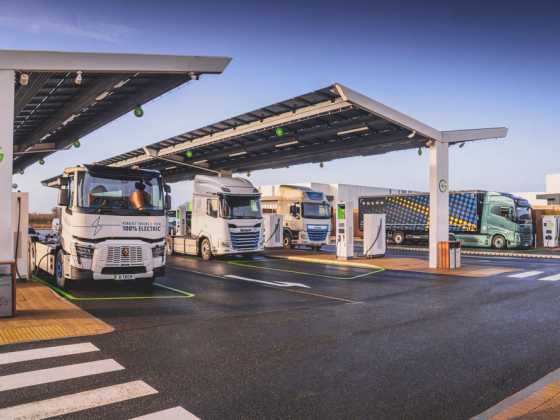A more efficient way of working
Is outsourcing merely a way for managers to achieve cost efficiencies or are there other benefits, asks Martyn Hart, Chairman of the National Outsourcing Association
 It seems that for many businesses, the slow and steady years of recession are all they can remember. The boom times of the 1990s, and the prosperity they brought with them, now feel like a distant memory for more and more organisations, many of whom are facing increased pressure to cut costs by any means necessary.
It seems that for many businesses, the slow and steady years of recession are all they can remember. The boom times of the 1990s, and the prosperity they brought with them, now feel like a distant memory for more and more organisations, many of whom are facing increased pressure to cut costs by any means necessary.
Of course, fleet managers are no exceptions to this rule, and it’s one of the reasons why an increasing number have been looking at outsourcing as a means of delivering the cost efficiencies they are looking for. But how successful is this approach? Is outsourcing merely a way for managers to achieve cost efficiencies, or are there other benefits?
KNOW YOUR OBJECTIVES
Perhaps the first way for fleet managers to begin answering these questions is to try to identify what they are trying to achieve. A range of outsourcing functions and options are now available, many of which have been designed to benefit both fleet managers and commercial vendors and to help ensure that productivity and efficiency is achieved. But it’s important to remember that not all of these will be relevant to every business.
It’s true that developments in technology have made it possible for operations to be outsourced with little or no fuss in today’s fleet operations, which has, in turn, opened the way for outsourcing to improve efficiency. But before any business can decide how outsourcing can best add value, it is imperative that they first identify what they want their project to achieve – it is the only way to measure how effective the project has been once it has been concluded.
Once these factors have been taken into consideration, both the supplier and the vendor can begin working together to build a successful, lasting partnership.
WORKING IN SYNC
Fleet operations and vendors cannot work in isolation of one another, and fleet managers must understand that collaboration can often be the secret of outsourcing success. For instance, the importance of suppliers gaining an insight into the business they are serving cannot be underestimated, and can play an important part in allowing them to understand the key operations, objectives and values by which they should operate. It’s also true that by developing an understanding of the end user’s business, suppliers will be much more able to help and understand any potential issues that may arise in the long run.
Another reason why it can be essential for fleet managers to work in sync with suppliers is that it helps them to identify cost reduction opportunities and implement them successfully.
The key to a successful working relationship within outsourcing is that any scepticism relating to fleet requirements and vendor responsibilities must be worked through together, with areas of responsibility for each part of the process clearly defined in order to bring about maximum benefit for both parties.
In order to remain on top of the fleet, managers need to effectively manage the acquiring, replacing and disposal of vehicles and equipment. Partnerships and collaboration can become an integral part of developing a future strategy as successful outsourcing partnerships are typically driven through entering into long-term, lasting contracts. End users and suppliers are also far more likely to result in a successful outsourcing relationship when communication is strong, meaning in turn that any issues can be dealt with quickly and effectively. Innovation and new ways of working can be established far more easily between two parties who communicate well with each other – increasing the chances of improving the efficiency of operations in the process.
INCREASING EFFICIENCY
The decision to outsource is also one which offers fleet managers the ability to keep up with developments within the industry, such as costs, legislation and service-related issues. Indeed, by outsourcing, managers have been allowed to dedicate more time towards taking on strategic work themselves, leaving back office functions or smaller jobs to a supplier.
This can prove cost effective when facing pressure to reduce costs and headcounts as well as streamlining operations. Fleet managers may want to consider outsourcing services such as vehicle maintenance, purchasing, as well as the process of maintaining and repairing equipment and vehicles.
One of the knock-on effects of this is that it allows fleets to take advantage of suppliers who are able to offer advantages on expertise which in turn can lead to greater control and management of economic resources. Managers of fleet are aware that as vehicles age, they need much more maintenance. This is where outsourcing offers benefits such as access to upgraded mechanical skills as well as staff which have been trained to effectively carry out these activities on a much wider range of vehicles than one in-house team can cover.
However, it is important for fleet managers to recognise that certain functions must necessarily remain in house in order to ensure effective management and achieve the most reasonable cost.
There is a need for an ‘intelligent customer’ interface between the user and supplier, someone that has some knowledge of the industry and can interpret supplier’s proposals into those best suited for the enterprise.
Often this is part of the ’governance’ structure of the organisation, although consultancies and management text books will present ‘governance’ as a sophisticated management process that is likely to demand the attention of more employees than you had running your fleet!
In fact, it is just common sense with some regular processes added.
It’s important to remember that outsourcing is not just a case of fire and forget. You do need to manage it, but in a different way. For instance, you may not need the world expert in tyre wear anymore, but you will need an appreciation of how vehicle maintenance and servicing can affect tyre wear and thus costs, especially if you are leasing tires.
But you also need to appreciate how the business needs to use the fleet, how the contract works, what the service levels are, what management controls you have. This means having a more horizontal set of skills and competencies rather than vertical, deep ones – as well as, of course, having the meetings and agendas fixed between you and your supplier for the life of the contract.
If you think about it, it is probably very much how you might run a large group or department in your firm now, but this time the employees are owned by someone else (as are the assets).
GETTING STARTED
If you are taking this journey for the first time, look at the core components of all your fleet operations to identify where outsourcing will work most effectively. With the job no longer dominated by the demands of the fleet, managers now need to focus upon areas such as increasing effectiveness, reducing costs and of course the myriad of regulations in environmental protection and occupational health and safety. The outsourcing company often has a better handle on regulations than the users because they can afford to invest in people that are expert in the matter. However, focusing on efficiency and cost control might seem to be difficult, now that the fleet and much of its support are with a third party.
In fact many managers are concerned that if they outsource they will lose control. This is not necessarily the case, particularly when you consider what has been made possible through the introduction of client-sever computing platforms as well as graphical user interfaces which have increased the ability and reach of fleet managers.
PERFORMANCE MANAGEMENT
The decision over which outsourcer to use will often be influenced through their ability to determine how to meet the fleet user’s needs in the most effective way, although caution is always welcome in this regard, as there are few guidelines or specifications for pricing, evaluating or measuring the quality of management information – particularly if work is offshored.
In order to counter this, a number of management companies have chosen to invest in internet-based performance measurement and reporting tools, which are then monitored on an ongoing basis. This further provides a wealth of business data that can be used in order to help improve business performance.
There are also a number of functions that fleet managers should strive to keep in house, such as business planning and budgeting. In order to allocate resources most effectively business plans need to be drawn up to be detailed, realistic and defensible, allowing managers to identify how money can be effectively saved for the business.
It is also key that policy creation is kept in-house in order to best meet the business need and objectives. Policy creation within the organisation can range from management of finances to fixed assets to inventories to personnel. These have an impact upon the business and require a deep understanding of how growth can best be made.
Outsourcing plays a role in changing fleet management responsibilities however the customer’s needs should be of the most importance when undertaking any work.
Managers need to be responsible and deliver key resources and quality in the manner they have promised. Of course if they need any support there is always the National Outsourcing Association.
For more information:
Web: www.noa.co.uk






